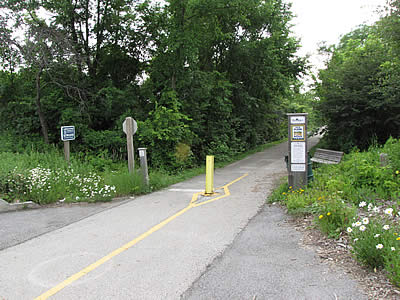
Old Plank Trail in Park Forest will finally connect moving east. (ENEWSPF)
By Nick Livers
Cook County, IL-(ENEWSPF)- The wheels are in motion for the Forest Preserve District of Cook County to give local cyclists a paved alternative to street travel throughout the southeast suburbs.
The Thorn Creek Bicycle Trail Completion Project will connect three separate portions of the Thorn Creek Trail, and link it to the Old Plank Road Trail in Park Forest and the Burnham Greenway. One of the newly connected portions of the Thorn Creek trail will be the “lost leg” between Joe Orr Road and 26th Street in Chicago Heights.
An approximately one mile stretch of trail beginning at Western Avenue and heading east will connect the Old Plank Road Trail to the Thorn Creek Trail.
Phase One, which includes 4.1 miles of new trail, a new bridge over the Union Pacific Railroad and an extension that will connect the Old Plank Road Trail to a new portion of the Thorn Creek Bicycle Trail is set to begin this fall, according to an email from Forest Preserve District of Cook County Landscape Architect III Dan White.
The construction contract has been awarded, and is currently going through the Illinois Department of Transportation approval process, according to White.
“Construction will begin as soon as IDOT issues a notice to start work,” White said. “Weather-dependent, we anticipate that Phase One will be completed in the summer of 2014.”
The federally funded Illinois Transportation Enhancement Program and the Congestion Mitigation Air Quality Program have awarded $4.7 million to the Forest Preserve District of Cook County, which will cover project costs, in addition to the construction of new sections of the Cal-Sag Trail between Lemont and Palos Park.
The project will add 4.75 miles of new trail in Thornton, Lansing, Glenwood, Chicago Heights and Park Forest to the existing 12.7 mile trail.
Phase Two will occur upon agreement of terms for an underpass under the Canadian National Railway, according to White.
The new trail construction is part of a larger project known as the Millennium Reserve, a sprawling conservation initiative with an area stretching from downtown Chicago to the Indiana border, and southwest to Wilmington, Illinois. Its goal is to restore green areas and enhance economic growth in an area once dominated by industry, which left a damaged natural landscape in its wake.
Its primary focus is known as the Calumet Core, a 220 square mile area that encompasses Chicago’s South Side, the entire southeast lakefront and 35 suburban municipalities, including Park Forest.
The project, which was unveiled in 2011 as part of President Obama’s America’s Great Outdoors initiative, underwent the first round of major project implementations this year. In March, Gov. Pat Quinn announced $5.8 million in state and local investments to continue development of the Millennium Reserve.
Public, non-profit and commercial entities are collaborating to form, “an on-going initiative guided by partners who understand community priorities, and it is designed to make on-the-ground projects happen. The initiative includes projects that range from neighborhood-based in scale to those of regional significance,” according to the Millennium Reserve’s web site.
The project is included among the Millennium Reserve’s 2013 Model Projects, and budgeting estimates were published in the Millennium Reserve’s 2013 Update to the District’s 5-Year Budgeting Plan.
When complete, the Thorn Creek Bicycle Trail Completion Project and the Cal-Sag Trail project will connect the trails to form a nearly 100-mile loop of trails throughout the Southland.

The current map, ending at Western Ave in Park Forest.








